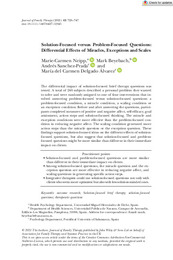Por favor, use este identificador para citar o enlazar este ítem:
https://hdl.handle.net/11000/35779
Solution-Focused versus Problem-Focused Questions: Differential Effects of Miracles, Exceptions and Scales
Título :
Solution-Focused versus Problem-Focused Questions: Differential Effects of Miracles, Exceptions and Scales |
Autor :
Neipp, Marie-Carmen 
Beyebach, Mark 
Sánchez-Prada, Andrés 
Delgado Álvarez, María del Carmen |
Editor :
Wiley |
Departamento:
Departamentos de la UMH::Psicología de la Salud |
Fecha de publicación:
2021-05-31 |
URI :
https://hdl.handle.net/11000/35779 |
Resumen :
The differential impact of solution-focused
brief therapy questions was
tested. A total of 246 subjects described a personal problem they wanted
to solve and were randomly assigned to one of four interventions that involved
answering problem-focused
versus solution-focused
questions: a
problem-focused
condition, a miracle condition, a scaling condition or
an exception condition. Before and after answering the questions, participants
completed measures of positive and negative affect, self-efficacy,
goal
attainment, action steps and solution-focused
thinking. The miracle and
exception conditions were more effective than the problem-focused
condition
in reducing negative affect. The scaling condition generated more
action steps than the miracle question or the exception question. These
findings support solution-focused
ideas on the different effects of solution-focused
questions, but also suggest that solution-focused
and problem-focused
questions might be more similar than different in their immediate
impact on clients.
|
Palabras clave/Materias:
outcome research
Solution-focused brief therapy
solution-focused questions
therapeutic questions |
Área de conocimiento :
CDU: Filosofía y psicología: Psicología |
Tipo de documento :
info:eu-repo/semantics/article |
Derechos de acceso:
info:eu-repo/semantics/openAccess
Attribution-NonCommercial-NoDerivatives 4.0 Internacional |
DOI :
https://doi.org/10.1111/1467-6427.12345 |
Publicado en:
Journal of Family Therapy (2021) 43: 728–747 |
Aparece en las colecciones:
Artículos- Psicología de la Salud
|
 La licencia se describe como: Atribución-NonComercial-NoDerivada 4.0 Internacional.
La licencia se describe como: Atribución-NonComercial-NoDerivada 4.0 Internacional.

 La licencia se describe como: Atribución-NonComercial-NoDerivada 4.0 Internacional.
La licencia se describe como: Atribución-NonComercial-NoDerivada 4.0 Internacional.
.png)